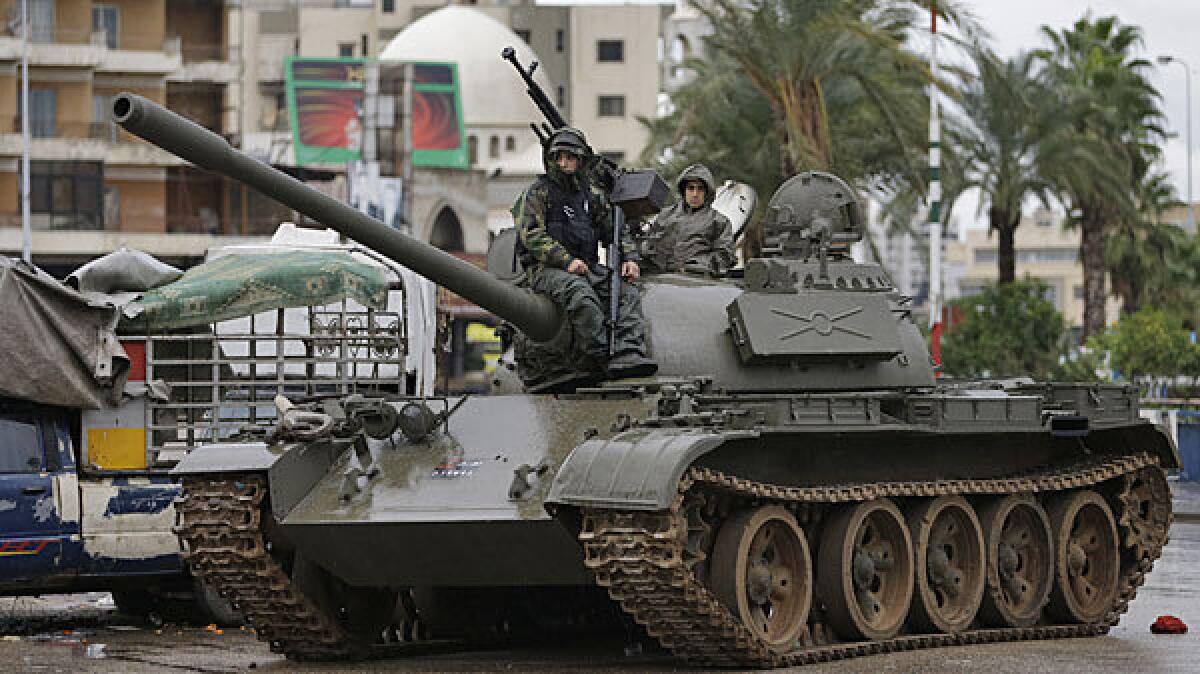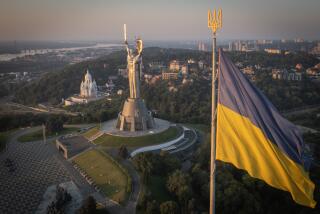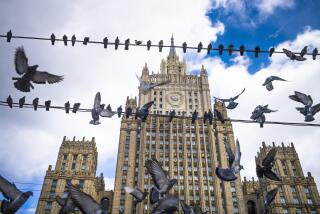Russia stands by Syria President Bashar Assad

BEIRUT â Russia said Sunday that it has no intention of pushing for the ouster of President Bashar Assad, as international negotiators seeking a way out of the escalating Syrian crisis again failed to reach a breakthrough.
Meantime, Syriaâs turmoil continued to spill over its borders, as four more people were killed in the latest spasm of Syria-related violence in the tense northern Lebanese city of Tripoli.
And in Syria, another day of fierce clashes and government bombardment was reported in the suburbs of Damascus as government troops battled rebels intent on cutting off the capital and its international airport.
Violence in Syria has long been outpacing efforts to reach a diplomatic solution. International mediators have stepped up attempts to broker a peace deal in recent days as clashes have intensified and fears have risen about the governmentâs potential use of chemical weapons on its citizens.
The sense that Assadâs rule is weakening amid rebel gains has prompted speculation that Moscow was finally willing to tell its longtime ally that it was time for him to go. U.S. and Russian talks in Dublin, Ireland, last week with the United Nationsâ envoy for Syria, Lakhdar Brahimi, added fuel to speculation that Moscow â which has on three occasions blocked proposed U.N. actions against Assad â was ready to cut the leader loose.
But Russian Foreign Minister Sergei Lavrov made it clear Sunday that Moscow had not soured on the Syrian president.
âWe are not conducting any negotiations on the fate of Assad,â Lavrov told reporters in Moscow. âAll attempts to portray things differently are unscrupulous, even for diplomats of those countries which are known to try to distort the facts in their favor.â
The latter comment seemed aimed at Western officials who had hinted that Moscow was ready to help expedite Assadâs departure after almost 21 months of civil conflict, tens of thousands of deaths and vast infrastructure damage.
Assad has not been seen publicly in recent days, though his portrait remains ubiquitous in pro-government districts of the capital and he recently told a Russian television station that he was born in Syria and planned to die there.
Russia has said repeatedly it is not wedded to Assad holding on to power, but insists that Syriaâs fate must be decided through negotiations among Syrians. Yet talks appear unlikely in such a polarized atmosphere: The armed opposition says it will not negotiate with Assad, whom it calls a killer, and the president said his government will not sit down with âterrorists,â its term for the armed opposition.
U.S. and Russian officials met Sunday in Geneva with Brahimi, the U.N. and Arab League special envoy on Syria. In a joint statement, they said the situation in Syria was âbad and getting worse,â but expressed hope that a political solution was âstill necessary and still possible.â
How to negotiate a way out when both sides seem intent on a fight to the finish is the question that has befuddled Brahimi and his predecessor, Kofi Annan, the Nobel laureate who left the Syrian special envoy post in August, describing his task as impossible.
After quitting, Annan said that Assad needed to step down for a solution to emerge. Brahimi has not endorsed that position.
Also on Sunday, Russia downplayed White House fears that a desperate Assad could deploy chemical weapons and said the greatest danger was that part of Syriaâs chemical arsenal could fall into the hands of rebels. Both U.S. and Israeli officials have also voiced concern that chemical armaments could end up in the hands of insurgents, who have overrun a number of military bases. Syriaâs fragmented rebel legions includes hard-core Islamist brigades hostile to the West and sympathetic to Al Qaeda.
In Lebanon, more violence erupted Sunday in Tripoli as Syria returned the bodies of three Lebanese men killed after crossing into Syria to join the anti-Assad rebels. At least four people died Sunday in a new round of sectarian-tinged clashes, according to news reports, bringing the reported toll to at least 17 in a week of fighting between pro- and anti-Assad factions in Lebanonâs second-largest city. Scores more have been wounded as feuding factions have exchanged sniper and rocket fire and launched grenades.
Diplomats fear that Syriaâs turbulence could eventually suck in Lebanon, with its weak central government and history of sectarian warfare, and also destabilize other adjacent nations, including Turkey, Jordan and Iraq. More than 500,000 refugees have already fled into neighboring nations, taxing the countriesâ ability to care for the influx.
More to Read
Sign up for Essential California
The most important California stories and recommendations in your inbox every morning.
You may occasionally receive promotional content from the Los Angeles Times.










